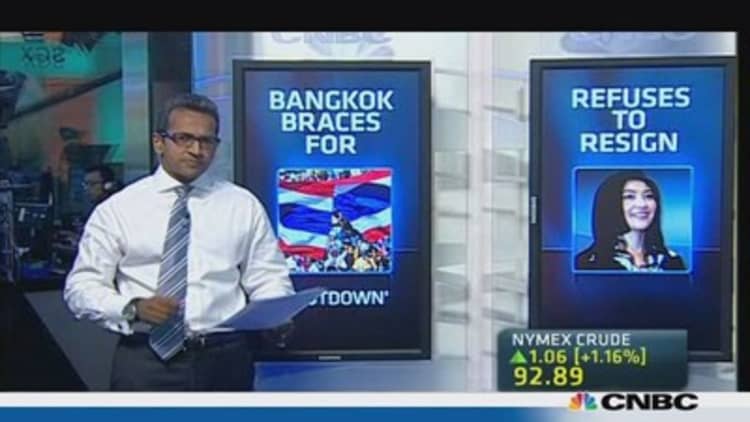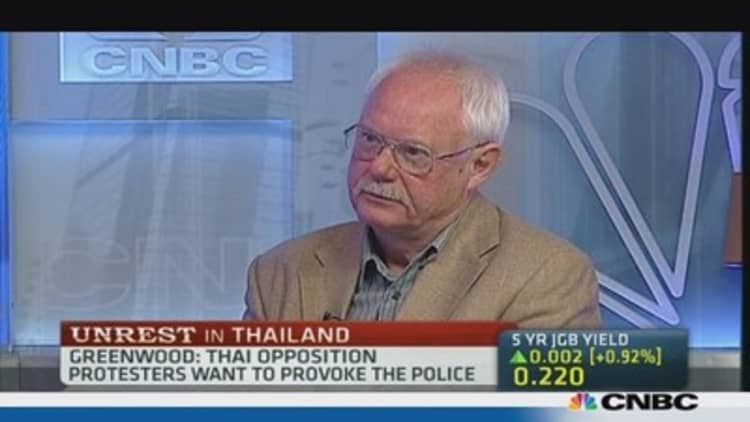
Thailand's current political turmoil has yet to impact major foreign investors with operations outside Bangkok but some multinationals fear a worsening risk profile and indicate a reluctance to approve expansions and new projects.
The latest bout of unrest and associated fears of softer economic growth has shaken equity, credit and currency market sentiment, with global investors pulling nearly $4 billion out of local stocks and bonds since early November. Still, foreign-owned factories have been spared the worst of the disruption as they're located in industrial complexes in provinces outside the Thai capital.
(Read more: Thai protesters move to shut down Bangkok)
Japanese-owned auto and electronics plants in Thailand have the most to lose if the political turmoil escalates, according to Gavin Greenwood, a regional political analyst with Hong Kong-based security firm Allan & Associates.
Companies such as Pioneer, Honda Motor and Toyota Motor, are the "canary in the coal mine," Greenwood told CNBC's 'The Call'. "They are showing increasing hesitancy and concern at what's happening," he said. However, "they haven't done anything about it yet," he added "but Japanese investment rather than anyone else's is the thing to watch."
'Prolonged Turmoil'
The Japanese Chamber of Commerce in Bangkok said in a statement on Jan. 10 it was concerned about the prolonged political turmoil in Thailand, saying the country is on the verge of losing credibility in the eyes of foreign investors, according to a report in The Bangkok Post on last Saturday.
"We have significant concerns about the current prolonged turmoil during a transition period in the Thai economy," Susumu Uneno, president of JCC Bangkok, said in the statement. "Japanese companies have been working closely with Thailand for a long time towards economic development. We hope this situation is settled soon and stability is restored."
(Read more: Thai turmoil, India data take spotlight this week)
A total of 1,524 Japanese firms are registered as members of JCC Bangkok, which has operated for 60 years, The Post reported, adding Investment from Japan including from JCC Bangkok members accounts for 60 percent of foreign direct investment.

Inside the Thai capital, companies are "switching on contingency plans," said Dennis J. Meseroll, Bangkok-based Director of business consultancy Tractus Asia. The American Chamber of Commerce in Thailand confirmed to CNBC that their members were ready to take precautionary measures if needed.
"As always, when unsettling events occur, U.S. companies have contingency and back-up plans to ensure business continuity and employee safety," Judy Benn, AMCHAM Thailand's Executive Director told CNBC in an email on Jan. 8. "Our member companies are ready to implement such measures if it becomes necessary."
(Read more: Thai political strife is far from over)
Meseroll at consultancy Tractus said though immediate disruptions are not expected outside Bangkok, businesses are increasingly questioning the longer-term viability of future expansions against an uncertain political backdrop, while the endgame in the present political drama appears particularly unclear making forward-planning doubly challenging.
A major question posed by big business both local and foreign, according to Meseroll: "What's the ultimate goal (of the protesters), other than just unseating the Thaksin family? If anyone says they know what's going to happen next, that would be folly."
Evolving Factors
The Thai political climate is an "evolving factor that influences business strategy," Tractus' Meseroll added. "Companies are always considering where they're going to locate. Over the last five to six years we had a couple of clients where we did regional site location projects who said they didn't want to look at Thailand."
Dane Chamorro, Managing Director of Control Risks' South East Asia practice, reinforced that view. Japanese businesses are not "giving up" on Thailand, he noted, but "are pausing actual in-country commitments" not just because of heightened political uncertainty but also a shortage of skilled labor.
(Read more: Thai turmoil, India data take spotlight this week)
Backed by its competitive advantage as the regional automotive hub, Japan will continue to be Thailand's largest foreign investor for the "foreseeable future," according to a January 12 research report co-authored by CIMB analysts Jason Todd and Rohit Sharma.
Still, "increased political uncertainty in the past decade as well as the major flood crisis in 2011 has made the investment environment in Thailand more uncertain," they added.

The Thai political climate is an "evolving factor that influences business strategy," he added. "Companies are always considering where they're going to locate. Over the last five to six years we had a couple of clients where we did regional site location projects who said they didn't want to look at Thailand."
Inevitably, duration and the severity of the current political impasse remains a key concern.
"My personal view is similar to many business leaders here that, just like every country, this kind of political unrest impacts business both directly and indirectly especially when it continues for a period of time with no light at the end of tunnel," said a Bangkok-based executive with U.S. multinational.
— By CNBC's Sri Jegarajah. Follow him on Twitter @cnbcSri


